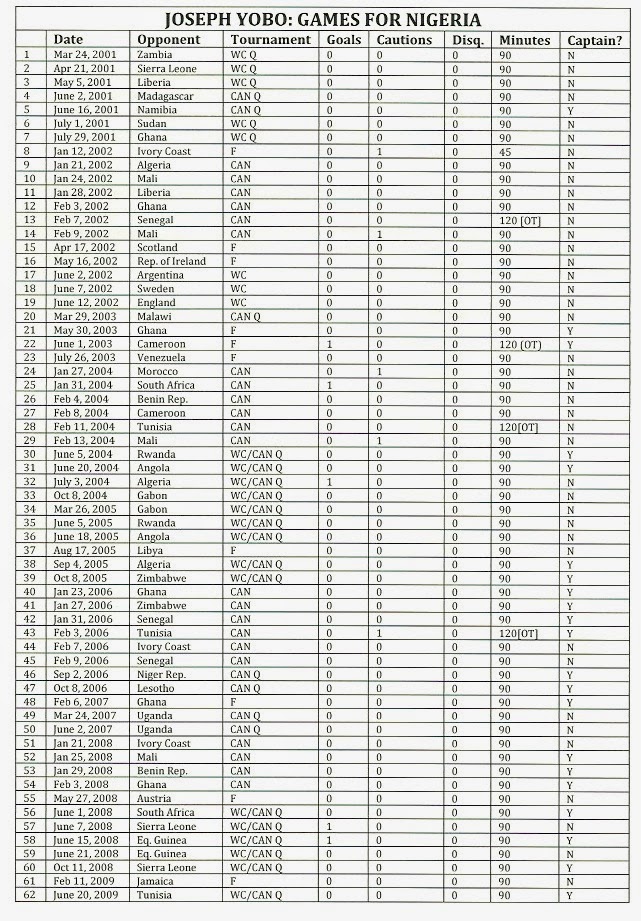STATS: Enyeama v Okala v Rufai
Many Nigerians are beginning to put Vincent Enyeama's name at the forefront of Nigeria's All-time best goalkeepers based on Enyeama's performances for Nigeria. Clearly, Enyeama belongs in that conversation. Not only is he approaching a record number of appearances for a Nigerian national team player, but he has been regarded as Africa's best for some years. However, it is best to also look at comparative data to find support for any claim of being Nigeria's all time best. In this piece, we compare Enyeama to two other goal keepers who frequently come up in those conversations -- Emmanuel Okala and Peter Rufai.
This is one of such comparisons that we intend to make going forward. In the future, we will compare Kenneth Omeruo (as leader of his defense) against other previous defensive leaders and we shall also compare Emmanuel Emenike against previous top strikers as well as Mikel Obi and Ogenyi Onazi against others. Though both Omeruo and Emenike do not have the repetitional stature of Enyeama, they are well regarded among the current top Nigerian players in their respective positions. Let me know if there are other comparisons that you wish to see.
It is important to note that in these comparisons some of the minutes assigned to the players may be off because of lack of precise minutes data. In such cases, we make statistical imputations for minutes in order to adjust data. However, cases requiring adjustments are well below 5% of all available cases.
In comparing the goalkeepers, we look at Competitive v Non-competitive games and we also compare the players on number and percentages of clean sheets kept as well as multiple goals conceded in games.
Graphs
Below we use four graphs to provide a visual descriptor of career performances comparing the three goalkeepers. The first graph shows percentage of games in which each goalkeeper conceded multiple goals i.e at least two goals. A more detailed data can also be found in Table 3 where the goalkeepers are further compared in terms of conceding two, three, or four goals each game. The graph shows that Okala has conceded far more multiple goals per game than both Rufai and Enyeama. Enyeama has done slightly better than Rufai based on this measure.
The second graph looks at games in which at least a goal was conceded by the goalkeeper. Here, Rufai does better than Enyeama but, again, both have statistically better results than Okala.
The third graph looks at percentage of games in which the goalkeeper keeps a clean sheet. This, as should be expected, reflects data already found in the second graph that we had just described. Rufai has the best result here with Okala behind both Rufai and Enyeama.
The final graph looks at average goals conceded per competitive game. Rufai conceded less, on average, compared to the other goalkeepers.
Tables
Graphs
Below we use four graphs to provide a visual descriptor of career performances comparing the three goalkeepers. The first graph shows percentage of games in which each goalkeeper conceded multiple goals i.e at least two goals. A more detailed data can also be found in Table 3 where the goalkeepers are further compared in terms of conceding two, three, or four goals each game. The graph shows that Okala has conceded far more multiple goals per game than both Rufai and Enyeama. Enyeama has done slightly better than Rufai based on this measure.
The second graph looks at games in which at least a goal was conceded by the goalkeeper. Here, Rufai does better than Enyeama but, again, both have statistically better results than Okala.
The third graph looks at percentage of games in which the goalkeeper keeps a clean sheet. This, as should be expected, reflects data already found in the second graph that we had just described. Rufai has the best result here with Okala behind both Rufai and Enyeama.
The final graph looks at average goals conceded per competitive game. Rufai conceded less, on average, compared to the other goalkeepers.
Tables
Table 1 compares the goalkeepers on minutes per game. Of the goalkeepers, only Okala is below 90 minutes per game in competitive situations. However, his minutes per game in non-competitive games is the highest. This is a reflection of Nigeria often using its best players in all games, competitive and non-competitive, during Okala's era. This Nigerian strategy has changed in recent times with regulars playing less minutes in non-competitive games.
Non-competitive games appear on Table 2. Here Vincent Enyeama leads in two areas even though he has played less non-competitive games than both Okala and Rufai. He has conceded in less games and has kept more clean sheets. Okala leads in the number of goals conceded per game.
On Table 3 shows multiple goals (at least two goals) conceded by the goalkeepers. Enyeama has conceded multiple goals in just 17% of games where he has failed to keep a clean sheet. Okala is a whopping 33%. However, Okala leads in that category when non-competitive games are compared. The table also shows the number of games where two, three, and four goals are conceded by each of the goalkeepers in both competitive and non-competitive games.
Concluding Statements
Concluding Statements
While there are other statistics that one can use in comparing goalkeepers, the statistics used here lead us to the following conclusions: (1) The perception of Okala as Nigeria's best all-time goalkeeper may well be a myth, at least statistically-speaking, and (2) Peter Rufai was a far better goalkeeper than he is given credit. It appears that Rufai's decision to come back for the 1998 World Cup when he was barely in match condition has tainted how Nigerian fans perceive his career. His play at the 1998 World Cup was horrendous and he paid a huge price for it. Beyond that, his overall career is spectacular. We will be comparing other players at other positions on future dates.





Comments
Post a Comment